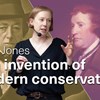ideologies
European integration and the reconstitution of socio-economic ideologies: Protestant ordoliberalism vs social Catholicism
Journal of European Public Policy Abstract Christian Democratic socio-economic ideology underwent a paradigm shift through the Europeanization of its party networks. Christian Democratic networks starte
Emily Jones: Afterlives: Edmund Burke, Benjamin Disraeli, and the Invention of Modern Conservatism
Venue: Institute for Futures Studies, Holländargatan 13 in Stockholm or online Research seminar with Emily Jones, Lecturer in Modern British History at the University of Manchester. Register here > Abs

Emily Jones: Edmund Burke, Benjamin Disraeli, and the Invention of Modern Conservatism
This paper will explore key findings drawn from my first monograph, Edmund Burke and the Invention of Modern Conservatism, 1830-1914: An Intellectual History (OUP, 2017) and my forthcoming book, One N

Filip Olsson
I work as a researcher in sociology at the Institute for Futures Studies. In the fall of 2024, I defended my dissertation, Culture and Implicit Cognitions, at Stockholm University. My dissertation focu

How to solve the climate crisis together
This projects aims to solve ideological conflicts when it comes to climate politics, by suggesting climate work that aligns with the different ideologies' values.

Josef Hien
I am interested in the connection between politico-economic institutions, religion, ideologies, and cultures. After receiving my PhD from the European University Institute in Florence in 2012 I had po
Climate Change Denial among Radical Right-Wing Supporters
i: Sustainability The linkage between political right-wing orientation and climate change denial is extensively studied. However, previous research has almost exclusively focused on the mainstream righ= 2216), a mainstream right-wing party (the Conservative Party,,= 634), and a mainstream center-left party (Social Democrats,= 548) in Sweden. Across the analyses, distrust of public service media (Swedish Television,), socioeconomic right-wing attitudes, and antifeminist attitudes outperformed the effects of anti-immigration attitudes and political distrust in explaining climate change denial, perhaps because of a lesser distinguishing capability of the latter mentioned variables. For example, virtually all Sweden Democrat supporters oppose immigration. Furthermore, the effects of party support, conservative ideologies, and belief in conspiracies were relatively weak, and vanished or substantially weakened in the full models. Our results suggest that socioeconomic attitudes (characteristic for the mainstream right) and exclusionary sociocultural attitudes and institutional distrust (characteristic for the contemporary European radical right) are important predictors of climate change denial, and more important than party support per se.
Is conservative opposition to climate change threat-based? Articulating an integrated threat model of climate change attitudes
British Journal of Social Psychology Abstract Throughout the literature, there are assertions that those endorsing conservative ideologies reject the science and solutions of climate change due to perce
Tobias Hübinette: The modern history of Swedish whiteness and Swedish race thinking
Tobias Hübinette is Associate Professor in Intercultural Education and a Senior Lecturer in Intercultural Studies at Karlstad University. ABSTRACTThis presentation aims at understanding today's situati

Conservative climate justice for a sustainable transformation
The purpose of this project is to determine whether, and how, conservative principles can support an effective and just low-carbon transition.








